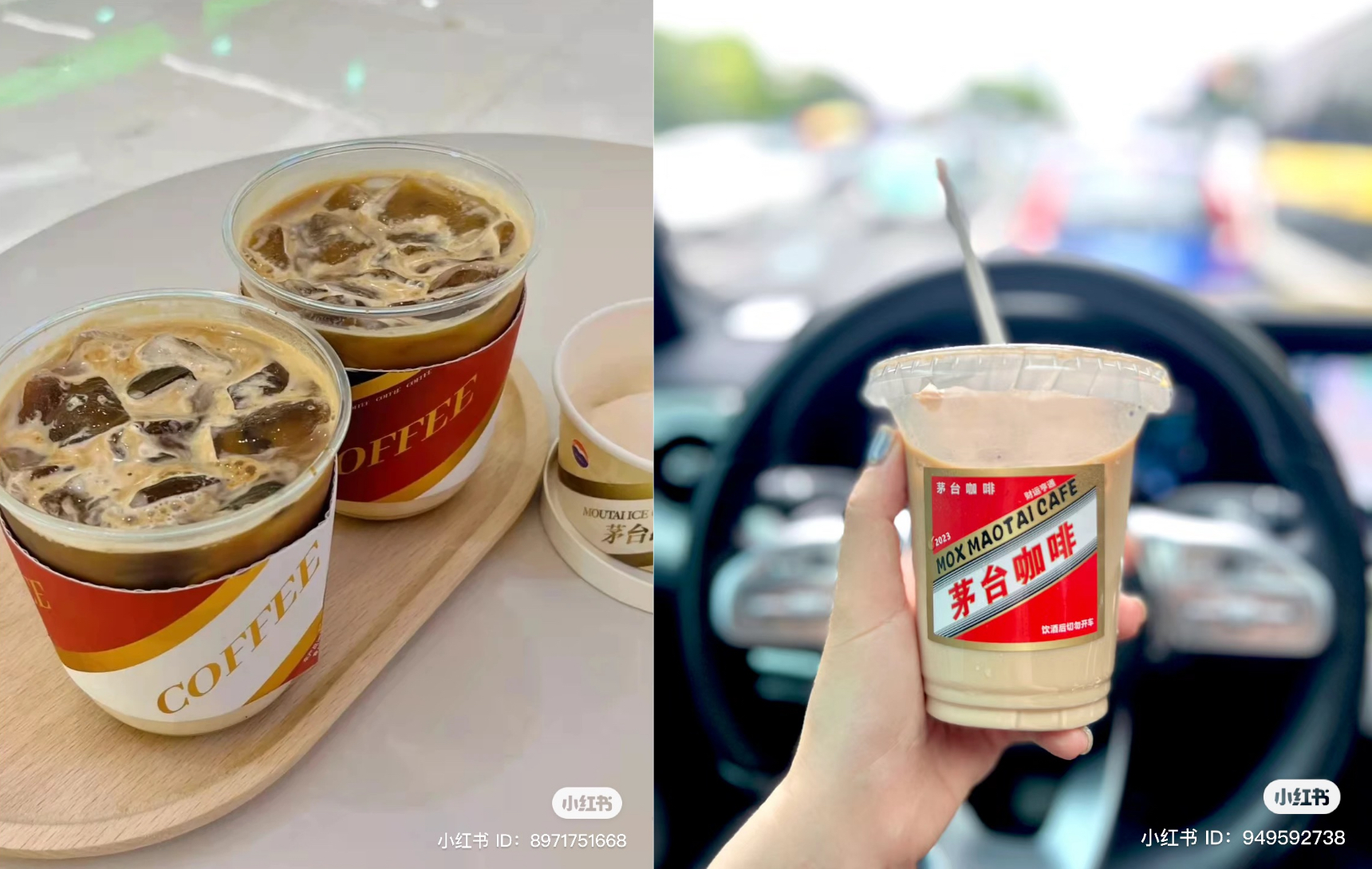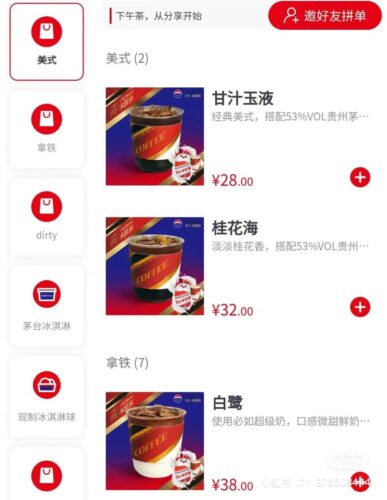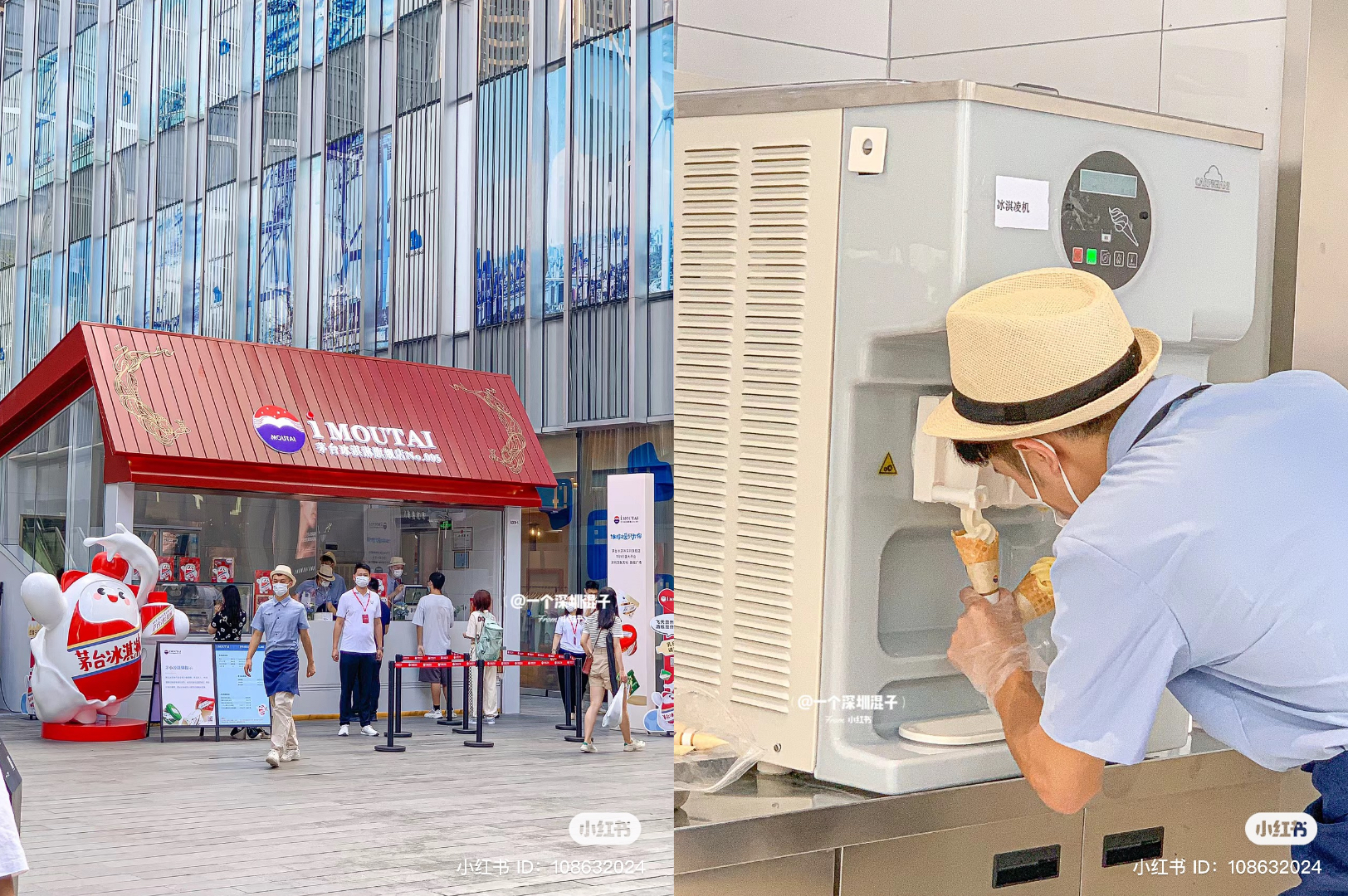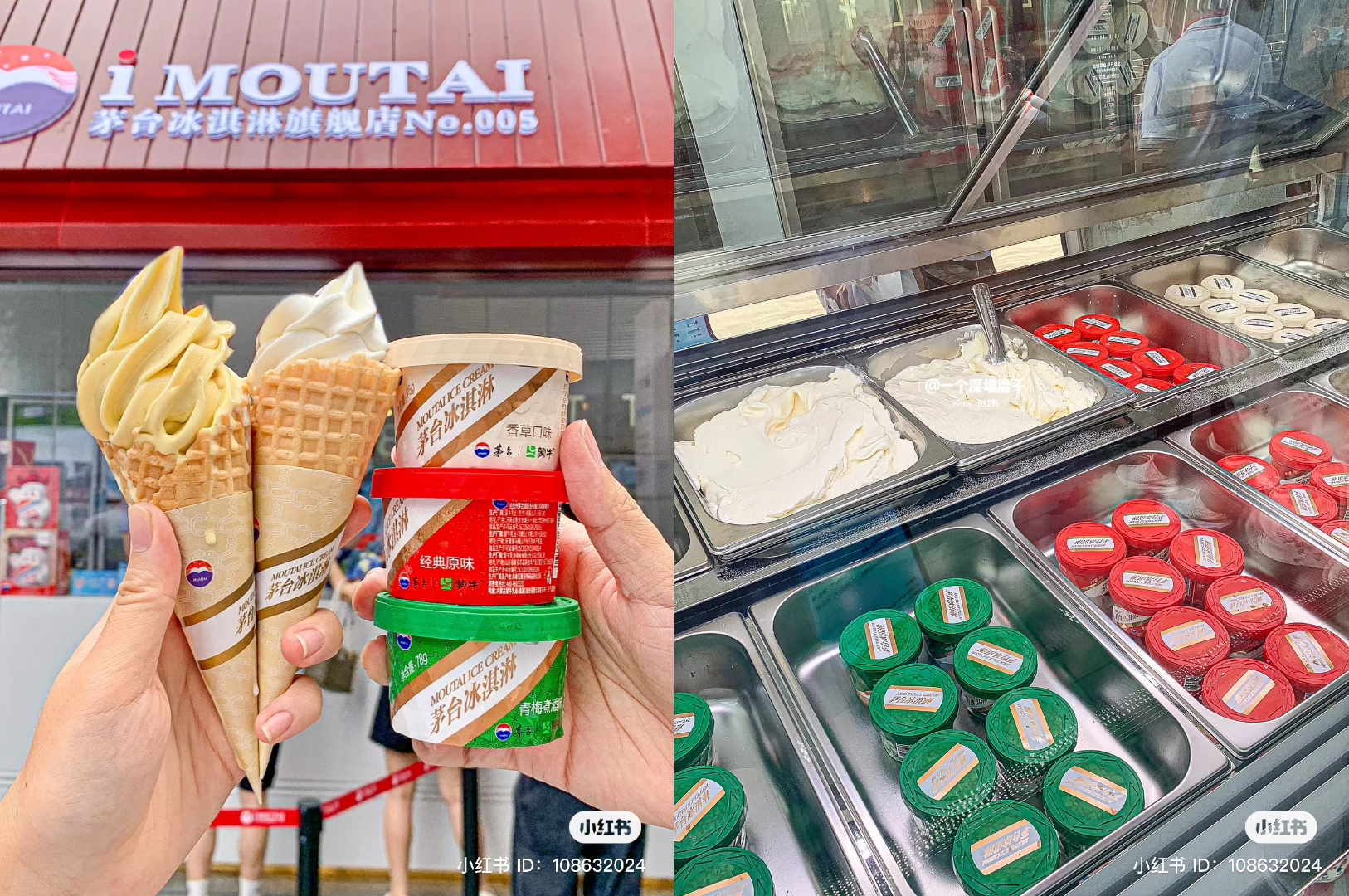Baijiu meets coffee: Moutai’s ice-cream stores now offer spirit-infused java
Although Moutai has for years been viewed as a status of wealth and power in China, it has struggled to broaden its customer base beyond middle-aged male drinkers. Enter baijiu-infused coffee.

Roughly a year after Kweichow Moutai, the Chinese liquor giant best known for brewing the fiery grain-based drink báijiǔ 白酒, opened dozens of ice-cream stores across the country selling alcohol-infused frozen treats, the esteemed company has soft-launched coffee drinks in an effort to expand its product lineup and appeal to the younger generation.
According to local news reports, Moutai-branded java debuted in its flagship ice-cream shop in Guangzhou last week, with 14 types of coffee drinks, including the Americano and latte. Priced between 28 yuan ($4) and 42 yuan ($6), all of the new items came with the option of an upgrade: a dose of the original version of Moutai Flying Fairy, the label’s signature product that’s 53% alcohol by volume (ABV).
China news, weekly.
Sign up for The China Project’s weekly newsletter, our free roundup of the most important China stories.
Similar drinks were then available in multiple Moutai ice-cream stores in cities like Chongqing and Zhengzhou, though pricing and ingredients varied. For example, rather than adopting the recipe from the Guangzhou flagship store, a Moutai store in Shenzhen paired its coffee with a cheaper and less intense version of Moutai Flying Fairy, at 43% ABV.

It’s unclear where they sourced coffee beans, but several Chinese news outlets reported that Moutai ice-cream stores in other parts of the country were also looking to join the trend, including those in Wuhan and Shanghai.
So far, Moutai hasn’t promoted these alcoholic coffee drinks through its social media accounts, and a spokesperson for the company said in an interview that it didn’t authorize such beverages, but industry experts said that by allowing its stores to continue running the new business, Moutai is testing the waters before an official launch of baijiu-infused coffee.

A throat-burning, expensive liquor loved by unscrupulous business executives and Party bosses
Established in 1999 and headquartered in the southwestern province of Guizhou, Kweichow Moutai is synonymous with the most expensive type of baijiu, a clear, colorless liquor often referred to as China’s “national spirit.” Made from fermented sorghum and rice, Moutai’s version of the fiery spirit is made through a year-long, labor-intensive process that involves seven rounds of distillation and a blending step that requires masters with specific knowledge of the production.
The premium image of Moutai partially stems from its long-standing links to China’s governing elite. Notorious for its high ABV, the throat-burning alcohol was a favorite of People’s Republic of China’s (P.R.C.) founding father, Máo Zédōng 毛泽东. His second-in-command, Zhōu Ēnlái 周恩来, famously served it at state dinners during U.S. President Richard Nixon’s visit to China in 1972. Two years later, when China’s future paramount leader Dèng Xiǎopíng 邓小平 made a trip to the U.S., then secretary of state Henry Kissinger told him, “I think if we drink enough Moutai, we can solve anything.”
For ordinary people, Moutai’s exorbitant price — roughly 1,500 yuan ($210) for a premium bottle — makes it a special drink exclusively for special occasions like wedding receptions. But for government officials and businesspeople, it has long been a common choice of liquor at social events due to its high-end reputation.
And because of its high price, Moutai was also commonly used in bribes, prompting a popular saying, “Those who buy Moutai never drink it, while those who drink it never buy it.” But its association with corruption has also made it an ideal target in the central government’s sweeping anti-graft campaign, which was launched in 2012 and is still ongoing.
But despite the government’s crackdown on expensive booze, Moutai still stands at No. 1 for China’s high-end liquor market right now, according to Allison Malmsten, an analyst at Chinese market research firm Daxue Consulting.
“In the long run, the crackdown on officials’ spending was merely a bump in the road for Moutai,” Malmsten told The China Project. “More recently, the pandemic was an even bigger hit for the company, as it’s largely consumed in business and family gatherings, which were restricted during the pandemic.”
Moutai is not the only baijiu maker in China, but it has long remained dominant. With a market capitalization of 2.12 trillion yuan ($296 billion), which is almost three times that of its nearest competitor, Wuliangye, Moutai is China’s most valuable publicly listed company outside its tech sector.
Making Moutai hip
Although Moutai has for years been viewed as a status of wealth and power in China, it has struggled to broaden its customer base beyond middle-aged male drinkers. The younger Chinese generation no longer values Moutai the same way as their elders did, said Malmsten, as “there are plenty of less strong and more flavorful options in the market,” where traditional Chinese distillers are also facing pressure from the growing popularity of whiskey and other Western liquors.
A shift in drinking culture also contributed to the changing perception of Moutai, Malmsten noted. In 2021, when a female employee of Chinese ecommerce behemoth Alibaba came forward accusing her manager and a client of sexual assault after an alcohol-fueled dinner during a work trip, the allegations prompted a national reckoning with China’s practice of coerced drinking, especially in business dealings.
In light of the scandal, China’s Central Commission for Discipline Inspection, the country’s top anti-corruption agency, made an official criticism of what it described as a “disgusting” business drinking culture, with many young workers vowing on the internet that they will break the custom.
“Chinese millennials and Gen Z are changing the drinking culture,” Malmsten said. “They are increasingly questioning after-work drinking and therefore not succumbing to peer pressure to drink in social situations.”
Moutai-doused coffee comes approximately a year after the brand launched its line of alcohol-infused ice cream in the summer of 2022 and opened a slew of brick-and-mortar stores serving the product. Developed in partnership with China Mengniu Dairy, Moutai’s ice cream is available in more than a dozen flavors, including matcha and chocolate, with prices ranging from 39.9 yuan ($6) to more than 100 yuan ($15) per scoop.

Chinese social media was alight last summer with fans hailing the innovation and naysayers complaining about its price. The demand was so high at one point that the ice cream was sold out everywhere, resulting in a resale market where opportunists stocked up on the novel dairy item and resold it for more than four times its original price.
More than 10 million servings have been sold. “Chinese consumers love novelty and are very open to trying new flavored snacks. Not only are they open to it, but sharing experiences on social media is also key for the Chinese consumer experience,” Malmsten explained. “Moutai leveraged these consumer habits with ice cream and is doing it again with coffee. Even if the product itself isn’t flavorful, the novelty of it is enough to create waves.”
Moutai’s expansion into the coffee business appears to be a follow-up attempt to reinvent its brand image among young urban professionals, a demographic that has grown increasingly fond of java and is crucial to Moutai’s future.
“Though coffee-drinking habits are not nearly as strong as in Japan, South Korea, or much of the West, what China’s coffee market has to offer is much more unique flavor combinations,” Malmsten said. “It’s like coffee-making is an experiment. It’s common to find lattes flavored with osmanthus or rose, and less common but still findable in Shanghai is tomato and cucumber.”
“China’s experimental attitude toward coffee makes Moutai’s entry into the coffee market less risky,” she added. “Additionally, coffee is very popular to share on Xiaohongshu and other social media platforms,” which are the main destinations for young people to find food inspirations in today’s China.






